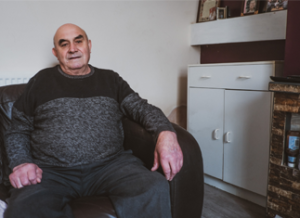Dear Member of Parliament
Re: The impact of the energy crisis in Northern Ireland
I am writing to you as a Northern Ireland MP to highlight our concerns that Northern Ireland’s energy consumers are facing a significant disadvantage when compared with their GB counterparts, and that this disadvantage could be further exacerbated in the coming months as we navigate through an unprecedented energy crisis.
In GB, energy bills are set to skyrocket as the energy price cap is due to be raised again. The announcement is due to be made on 7 February with the impact being felt from 1 April. National Energy Action (NEA) estimate the record rise in October 2021 resulted in over 500,000 more households pushed into fuel poverty and further rises to the price cap in April are likely to result in a doubling of the cost of heating an average home compared to last year.
We know that over the same period, those on the lowest incomes and households that contain someone with a long-term illness or disability that reduces their ability to work have seen their income drop by over £1000 per year. In addition, inflation remains at a record high, meaning that the cost of other essential goods also continues to soar. This places the biggest burden on the shoulders of the poorest and most vulnerable households.
Whilst NEA NI welcome any interventions to protect vulnerable consumers, we are concerned that Northern Ireland’s vulnerable consumers could be at risk of being left behind.
As I am sure you are aware, your constituents in Northern Ireland have already had the rising energy costs passed through to them from their energy supplier. On the 1st January Northern Ireland’s largest electricity company, Power NI, increased its prices for domestic customers by 21.4%. This was the second price rise announced in last year and meant that the average household would be required to pay an additional £131 per year.
For gas customers the situation is even more acute. In Northern Ireland the average annual household gas bill has rocketed from £461 (October 2020) to £968 as of December 2021. In the Ten Towns area, the sole provider of gas firmus Gas, has raised their prices three times between April and December.
In Northern Ireland our regulator does not currently employ a price cap. The GB price cap sets a limit to how much energy firms can charge customers for gas and electricity and was introduced in 2019 to help households who do not regularly switch suppliers. Ofgem, the energy regulator, determines the level of the cap twice a year, and it is adjusted in April and October. Crucially this means prices rises are passed through to consumers at set periods, meaning consumers have more time to prepare and react. In Northern Ireland our regulation dictates that the regulated companies announce a price increase 21 days in advance of the pass through and they can approach the Utility Regulator at any time throughout the year to initiate that process. This has meant that the rapid rise in energy prices over recent months has been passed through to the householder making it incredibly difficult for households to budget accordingly.
Along with not having a price cap in place to protect consumers from rapid energy price hikes, vulnerable consumers in Northern Ireland are further disadvantage as they do not have access to the benefits of the Warm Homes Discount (WHD) scheme. The WHD provides for mandatory social price support to reduce energy bills for the most vulnerable. Qualifying households in GB receive a £140 discount on their electricity bill between October and March. NEA NI welcome any efforts to ensure GB consumers are protected against the impacts of the April price cap review and we want to ensure that any interventions put in place by HM Treasury must also include provision to support vulnerable consumers in Northern Ireland.
Over the last number of weeks, National Energy Action NI has experienced a significant rise in the number of households seeking emergency support. We expect this trend to continue as we believe as many as 40% of households will now be struggling because of spiralling energy costs.
Unfortunately, this means that many households in Northern Ireland face the prospects of living in cold homes for longer periods of time, especially during the winter months. Homes play a crucial role in ensuring the health and well-being of individuals and households, and NEA believe that everyone in Northern Ireland should be entitled to a warm, safe, and healthy home.
We trust that you will be a strong advocate for your constituents in the weeks and months ahead and work to ensure that vulnerable consumers in NI are protected from further disadvantages.
If you would like to discuss our concerns further or would like more information on fuel poverty in Northern Ireland, my team and I would be more than happy to meet with. To arrange a meeting please contact our policy officer at jamie.miller@nea.org.uk.
Yours faithfully
Ms. Pat Austin
Director
National Energy Action (NI)















